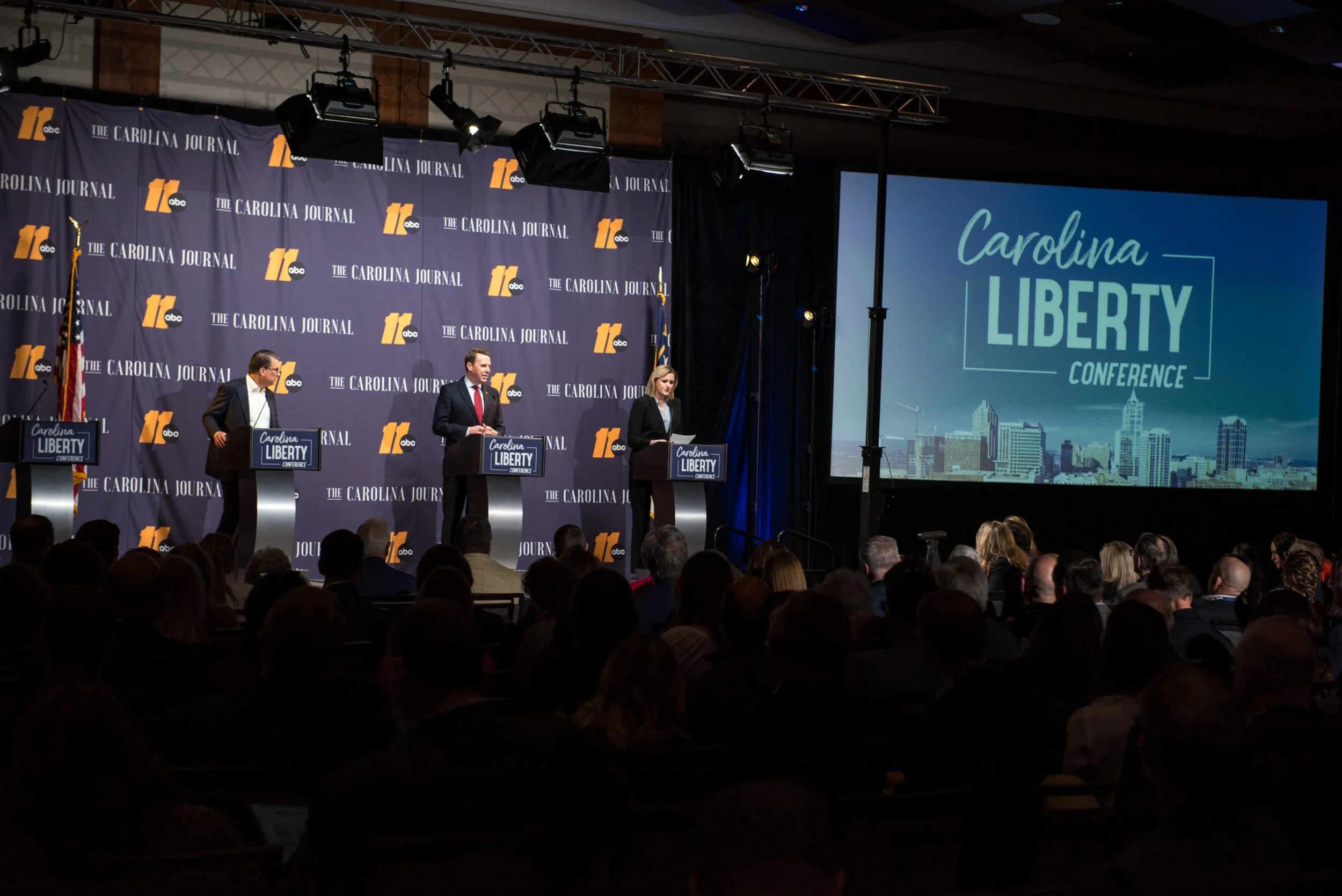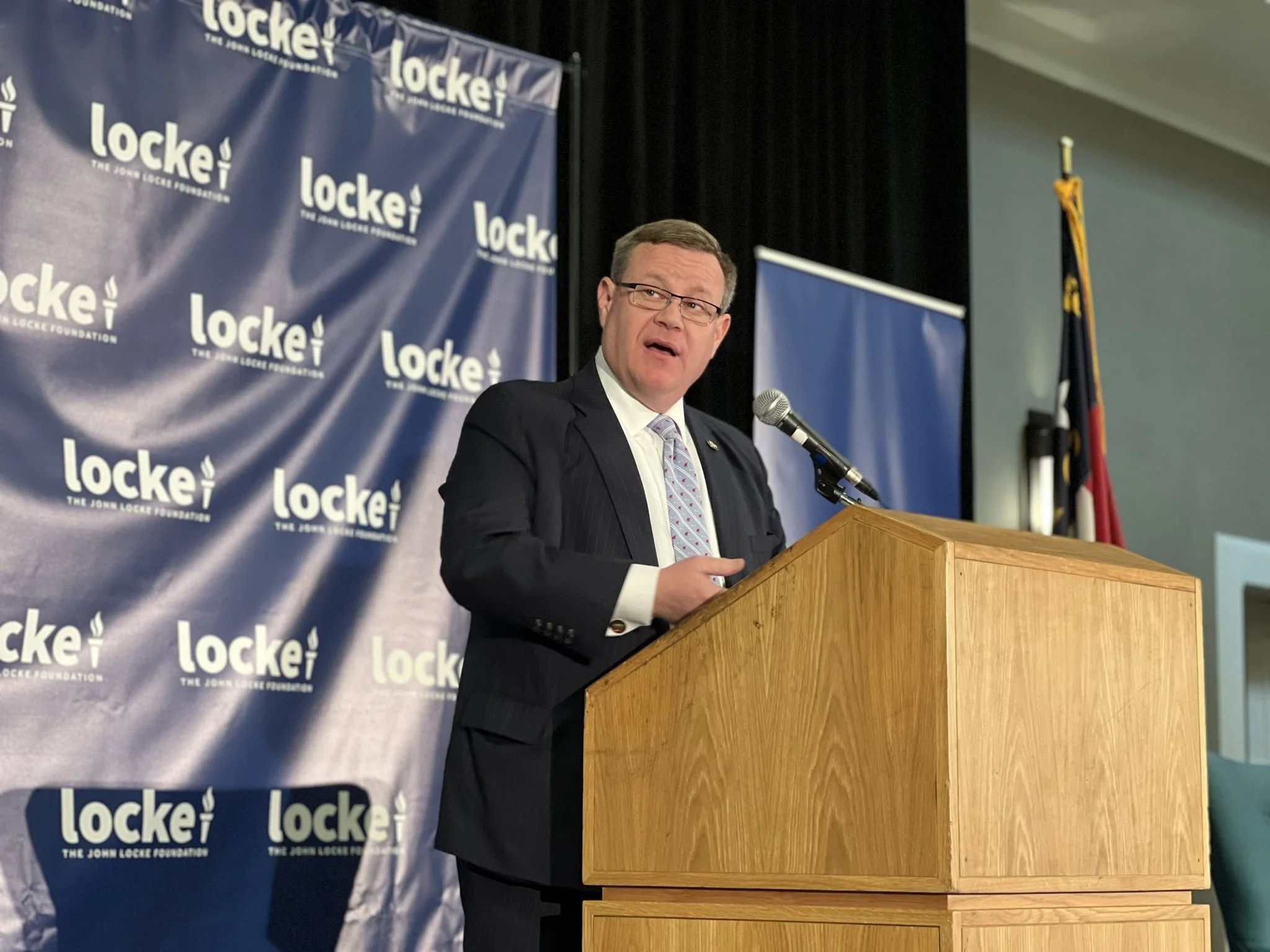Senate primary debate offers fireworks despite Ted Budd's absence
By John Trump, Carolina Journal
A debate Saturday among three Republican candidates to replace retiring U.S. Sen Richard Burr, R-N.C., was substantive and respectful yet offered just enough fireworks to spark small fires throughout.
The U.S. Senate Republican primary debate marked the culmination of the Carolina Liberty Conference in Raleigh, sponsored by the John Locke Foundation. Candidates Marjorie Eastman, Pat McCrory, and Mark Walker, who met specific polling and fundraising criteria established by the sponsor, took part in the debate. Candidate Ted Budd also qualified for the debate but declined to participate.
Donna King, Carolina Journal editor-in-chief, and Jonah Kaplan of WTVD television moderated the Raleigh debate.
One interesting aspect of the debate was the presence of an empty podium, which — from the crowd’s view — sat idle at McCrory’s right. Budd, who currently serves in the 13th Congressional District of the U.S. House, declined an invitation to attend the debate, though he did speak this weekend during the Conservative Political Action Conference in Orlando. A podium was reserved for Budd, but it stayed vacant. Former President Trump endorsed Budd for the Senate seat in June 2021.
The debate included some light moments. Walker, a former three-term congressman, generated chuckles with one quip directed at McCrory, North Carolina's last Republican governor. McCrory had said he always wanted to be a teacher.
“It’s not too late,” Walker replied.
McCrory served as Charlotte mayor before his single term as governor. He lost a re-election bid to Democrat Roy Cooper in 2016, the result of a hotly contested and debated election decided by fewer than 10,000 votes. McCrory later hosted a highly rated morning radio show on WBT in Charlotte.
Things got somewhat heavier, too, including an exchange by the former governor and Eastman after McCrory tried to offer her a lesson in N.C. politics and welcome her to the Republican Party.
Eastman is a newcomer to the race and, for that matter, politics. A Californian by birth, Eastman is an Army veteran who served from 2002 to 2012. Her experience outside the military includes work as an author, speaker, and independent consultant, according to Ballotpedia.
She called McCrory’s comments “insulting” and asked whether he served in the military, a consistent mantra by Eastman throughout the debate.
“I’m proud to be a North Carolinian,” she shot back.
Walker feigned ducking for cover behind the podium. “I’m the one who served in combat here.” Walker won election to Congress in 2014 and served until January 2021. A Baptist minister, Walker chose not to run for re-election in 2020.
The three candidates agreed on many points. They all supported many of the same policies as Trump, that the current Democratic leadership in Washington has failed and needs an overhaul, and that government, in general, is too big, too bureaucratic, and clearly out of control. They also agreed that Russian President Vladimir Putin deserves harsh punishment for his country’s invasion of Ukraine, a dire need to rein in inflation, and that education is best left to communities and parents.
They, too, took turns taking shots at Budd, who was invited to take the podium at any point in the debate. He never did.
The candidates diverged, however, on the primary question: Why are they the best candidate to represent North Carolina in the U.S. Senate alongside Thom Tillis?
Eastman didn’t miss a chance to talk about her military service and that she was the only “mom” on stage. She called herself an outsider who wants to serve North Carolina. Eastman says she is the education-first candidate and always listens to parents.
“You can pick a politician, or you can pick a fresh voice who wants to serve her country again,” she said.
McCrory made repeated reference to his record as North Carolina governor, taking a $2.3 billion deficit and turning it into a $4 billion surplus. He talked of ridding the government of nonproductive workers and demanding efficiency.
“I knew it as a governor, and I knew it as a mayor,” said McCrory, the third Republican elected governor in North Carolina since the Civil War.
“I fought for every one of you, and I stood up for the values of North Carolin, and it might have cost me the [2020 governor's] election. I’m proud of my work.”
Walker, flanked by Eastman to his left and McCrory to his right, focused on his record in Congress.
“I know what it’s like to get things done in the U.S. Congress,” he said.
He touted his record against voting on big spending plans, including calling out senators who voted for the same plans.
Walker talked about a dedication to diversity yet a commitment to hiring the best person for the job on his own staff. “I didn’t hire them because they were black or brown, I hired them because they were the best.”
He said we, as Americans, are in the midst of a spiritual crisis. That individualism and hope are key to a constitutional republic, and that individual rights are bestowed not by government but, rather, “God Almighty” alone.
Shrinking government is a priority for Walker.
“The smaller you can make government, the better chance of making it effective.”
“I want government to be so small you can’t even see it.”



